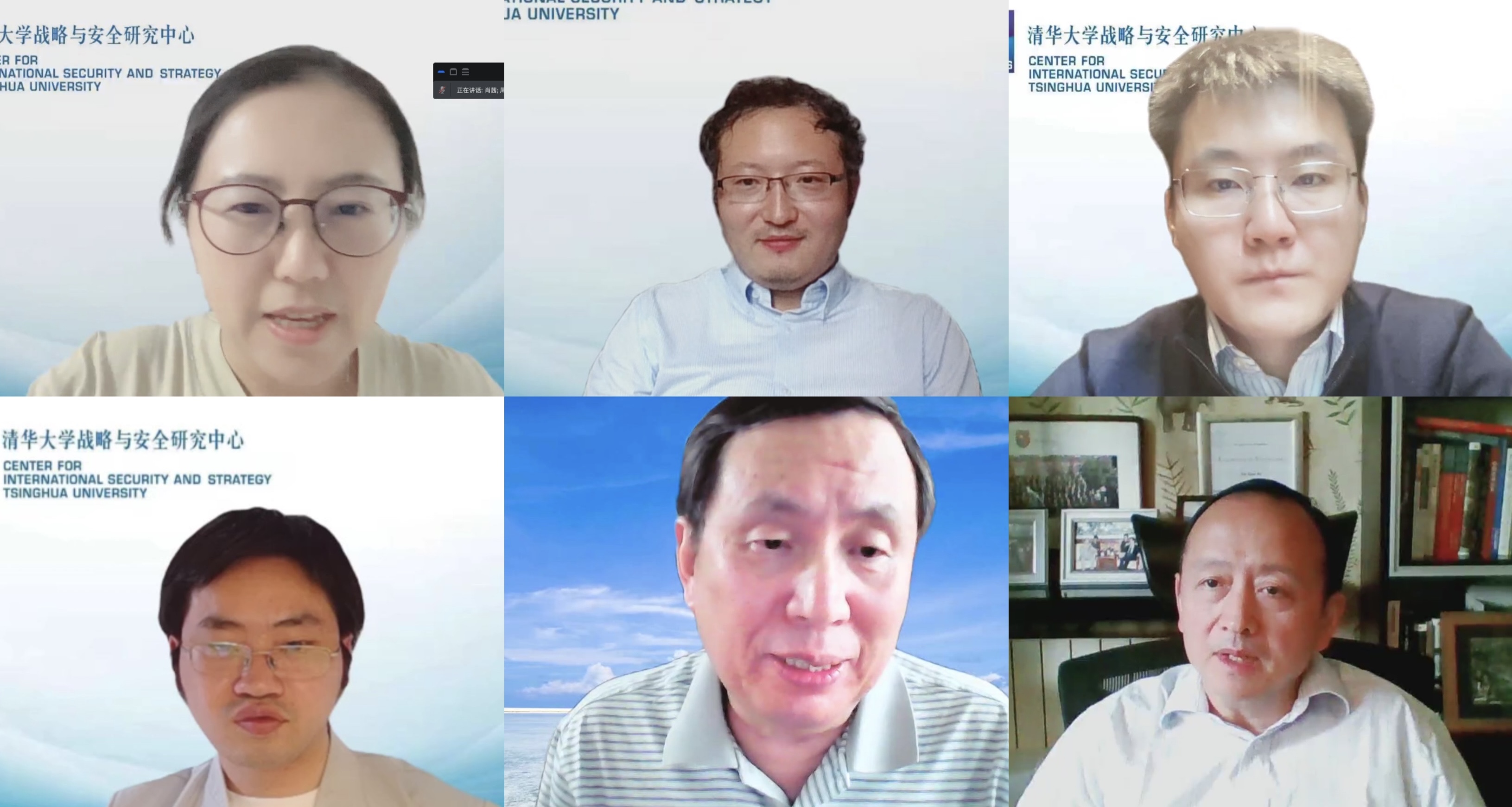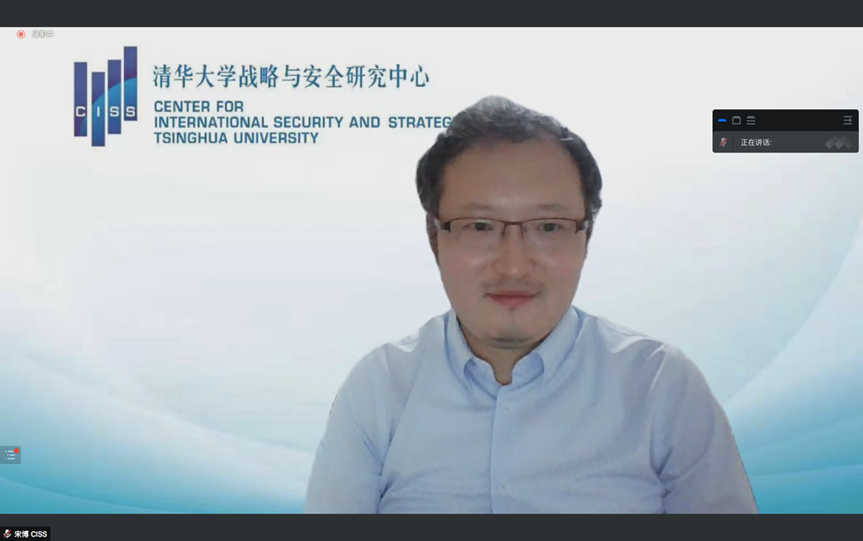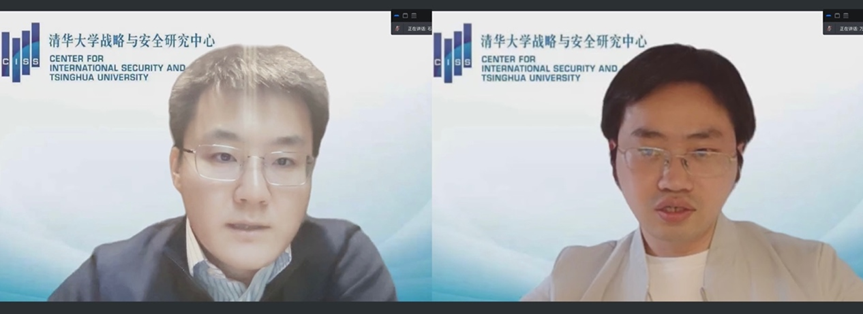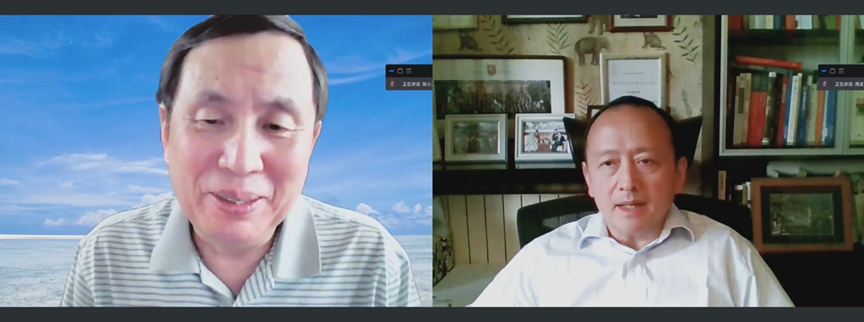

In the afternoon of May 31, the Center for International Security and Strategy (CISS) of Tsinghua University held the 3rd StratFocus Forum themed “Decision-Making Logic Behind Russia’s Overseas Military Operations,” which attracted over 300 attendees online. Featuring CISS Fellow Song Bo as the keynote speaker, the virtual event also invited as panelists Shi Jing, assistant professor at Tsinghua University’s Institute of International and Area Studies and research fellow at St. Antony’s College, Oxford University, and Wan Qingsong, associate professor at the Center for Russian Studies and graduate program adviser at the School of Politics and International Relations, East China Normal University. The discussants explored the decision-making logic of Russia’s military operations abroad and its influencing factors, which was followed by comments from Chen Xiaogong, CISS academic member, former deputy director of the Office of the Foreign Affairs Leading Group of the CPC Central Committee and former deputy commander of the Chinese Air Force, and Zhou Bo, former director of the Center for Security Cooperation in the Chinese Ministry of National Defense’s Office for International Military Cooperation. The forum was moderated by CISS Deputy Director Xiao Qian.

Keynote Speaker Song Bo
In his keynote speech, Song Bo pointed out that there are two main frameworks for analyzing the logic of Russia’s overseas military operations: one is based on history and culture, and the other on military security. He also looked at the country’s “emotional attachment to Soviet Russia” and the personal factors of political strongmen.
Using the chain of decision-making as an entry point, Song clarified misconceptions about Russia’s military decisions, arguing that its military does not play a dominant role in the decision-making process, and Russia’s military actions against Ukraine were not conspired, but initiated by its mainstream decision makers. Looking back at the country’s military operations abroad, he believes they are all built on the lessons Russia learned from the Kosovo War—conventional deterrence cannot help it achieve its objectives. The Russo-Georgian War, on the other hand, helped Russia regain its confidence and determination to send troops abroad. By following how the West had instigated Kosovo’s independence, Russia found a solution to unrest in pro-Russian regions. In the Crimea crisis, Russia did a “cost-benefit” analysis and concluded that annexing the peninsula would be the most cost effective, but this hasty decision also created substantial legacy issues. In the Syrian civil war, Russia engaged with multiple parties. Today, the unresolved issue of pro-Russian forces’ political status has led to a protracted conflict with Ukraine.

Panelists Shi Jing (left) and Wan Qingsong (right)
The panelists also shared their perspectives on the Russia-Ukraine conflict. Shi Jing’s analysis was built on three dimensions: Russia’s historical identity, Ukrainian identity, and the general features of Eurasian countries’ development transition. First, he believes that many historical details of Russia, Ukraine, and Belarus are interconnected, and the territory of present-day Ukraine was historically influenced by its neighbors. Second, by validating and analyzing historical facts, he presented the historical context of how Ukrainian national identity emerged and what it actually means; after Ukraine gained independence in the 1990s, this identity from a Ukrainian perspective became the basis for explaining the rationality of the country’s political actions and national development. Furthermore, considering the general features of the current transformation in Eurasian countries, the Russia-Ukraine conflict can be seen as a reflection of the fact that the region is still in transition—there are always different interpretations of history behind the realities on the ground.
Wan Qingsong looked back at the 30 years of Russia’s engagement with the “old world” since the end of the Cold War and divided it into four stages: “join them if I can’t beat them,” “discontent and disappointment,” “breakout and anxiety,” and “domestic security and rebirth,” which depicted the complex journey behind the Russian political elite’s decision of a special military operation against Ukraine. Can the Russia-Ukraine conflict be the starting point for Russia’s “rebirth” and the beginning of a new world? Based on the “war-reform” cycle in Russian history and the history of how great powers have influenced the world through self-transformation, Wan Qingsong believes that this conflict can be seen as the ultimate test for Putin’s 20 years of reforms.
The keynote speaker and the panelists then took questions from the online audience.

Commentators Chen Xiaogong (left) and Zhou Bo (right)
CISS Academic Member Chen Xiaogong and Senior Fellow Zhou Bo wrapped up the event with their comments. Chen Xiaogong dismissed the West’s narrative of the causes of the Russia-Ukraine conflict, arguing that it is unrealistic to put all the blame on Russia, as NATO’s eastward expansion has also played a very important role. State decision-making is a complex process, and an “either democratic or authoritarian” discourse system in the decision-making model is not realistic, he noted. According to Zhou Bo, Russia had underestimated Ukraine’s resistance at the outset of the war—despite its military presence on multiple fronts, it failed to achieve its strategic objectives, and eventually had to focus on the east. Zhou believes there is a high probability that the war will drag on for a long time. If NATO increases its assistance to Ukraine’s heavy offensive weapons, the possibility of Russia using tactical nuclear weapons in extreme cases cannot be ruled out. In order to avoid a nuclear war, NATO could unilaterally pledge not to be the first to use nuclear weapons against Russia as a sign of goodwill; secondly, it should “stop its expansion” in exchange for Russia’s “no first use of nuclear weapons”; the third step is for NATO to scale down its conventional weaponry in which it has an absolute advantage, in exchange for Russia to cut its nuclear weapons.
About CISS StratFocus Forum:
The CISS StratFocus Forum is launched by the Center for International Security and Strategy of Tsinghua University, with the objective of fostering more talents and building an academic community on security and strategy. The forum, which will be held monthly, aims to serve as an academic exchange platform for students and young scholars in the fields of strategy, security, international relations and diplomacy, where they will be invited to discuss international hotspot issues and cutting-edge research in their disciplines.
